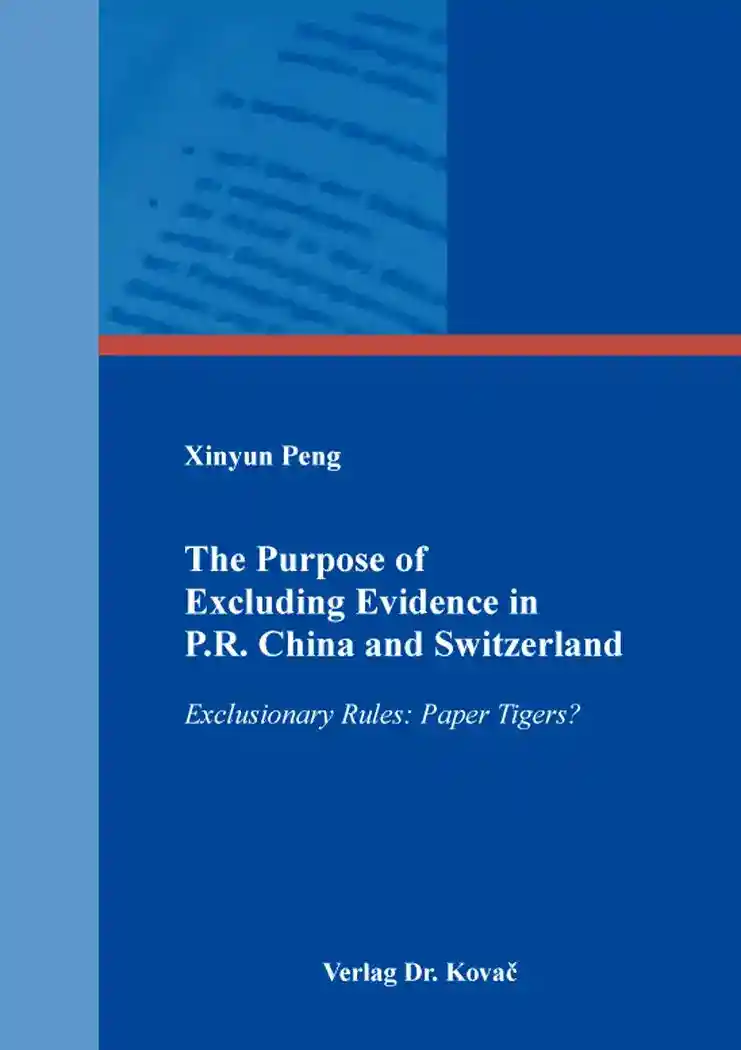Xinyun PengThe Purpose of Excluding Evidence in P.R. China and Switzerland
Exclusionary Rules: Paper Tigers?
Studien zur Rechtswissenschaft, Band 457
Hamburg 2021, 186 Seiten
ISBN 978-3-339-12116-5 (Print) |ISBN 978-3-339-12117-2 (eBook)
Zum Inhalt
In 2012, the People’s Republic of China – which in its criminal justice system habitually strives for comprehensive fact-finding in order to hand out punishment to wrongdoers – adopted exclusionary rules. In 2011, just one year earlier than China, Switzerland, a country far removed from China, also established exclusionary rules in its first uniform Swiss Criminal Procedure Code, mainly by codifying rules existent in the cantonal procedural codes or established by the courts long ago. The research intends to find out the rationale for excluding relevant evidence in the two countries. Despite the differences between Chinese and Swiss legal systems, both countries, on one hand, recognize the truth should not be searched at any price; nevertheless on the other hand, both they acknowledge that the common interest of criminal proceedings is to establish the truth.
Firstly, this dissertation explains that in the Chinese criminal justice system, exclusionary rules are more concerned with ensuring what could be called a harmonious proceeding than with the fairness of proceedings. A harmonious proceeding refers to that Chinese laws seek to reach an agreement within limits by overcoming dissent and discord and thus to ensure none of the relevant participants losing face (mianzi-面子).
Secondly, while in Swiss criminal justice system, the hope that exclusionary rules ensure a fair trial is based on a double hypothesis: (a) that legislators intend to ensure a fair trial through excluding evidence; and (b) that the legal framework, at least theoretically, provides a supportive mechanism to safeguard a fair trial. By examining whether the ECtHR provides a common legal framework to determine the admissibility of evidence, the dissertation claims that the Swiss criminal justice system presents a clearer approach to determine the admissibility of evidence.
Thirdly, the dissertation explains whether the enforcement of exclusionary rules meets the legislators’ expectations in Chinese and Swiss criminal justice system. Despite the different purposes existing in the Chinese and Swiss criminal justice systems, the exclusionary rules reach a similar result in the two countries: the legal authorities have an incentive to comply with procedural rules, since they have to fear the exclusion of evidence.
However, the way exclusionary rules are handled a) in Chinese system provides legal authorities alternatives to maintain a harmonious proceeding rather than excluding evidence; while b) in Swiss system gives legal authorities “emergency exits” that enable them to reintroduce the balancing approach if needed. Lastly, the dissertation research concludes that the exclusion of evidence does not always work as smoothly in practice as the law on the books.
Ihr Werk im Verlag Dr. Kovač

Möchten Sie Ihre wissenschaftliche Arbeit publizieren? Erfahren Sie mehr über unsere günstigen Konditionen und unseren Service für Autorinnen und Autoren.
